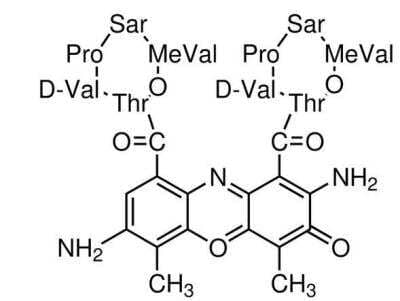7-Aminoactinomycin D Solution
Novus Biologicals, part of Bio-Techne | Catalog # NBP2-29446

Key Product Details
Applications
Flow Cytometry
Product Summary for 7-Aminoactinomycin D Solution
Appearance (Form) Powder
Appearance (Color) Red to Dark Purple
Solubility (Solvent) Chloroform
Solubility (Conc) 0.95 - 1.05 mg/ml
Solubility (Turbidity) Clear
Solubility (Color) Red
Purity (HPLC) > 95.50%
Appearance (Color) Red to Dark Purple
Solubility (Solvent) Chloroform
Solubility (Conc) 0.95 - 1.05 mg/ml
Solubility (Turbidity) Clear
Solubility (Color) Red
Purity (HPLC) > 95.50%
Product Specifications
Specificity
7-Aminoactinomycin D Solution
Molecular Weight 1270.43
Molecular Weight 1270.43
Application Notes
Fluorescent DNA stain
7- Amino-Actinomycin D (7-AAD) can be used as a viability probe for methods of nonviable cell exclusion based on light scatter and uptake of the reagent as detected in FL3. 7-AAD is excluded by viable cells but can penetrate cell membranes of dying or dead cells, in which it intercalates into double stranded nucleic acids. It can be used in place of Propidium Iodide (PI) for omission of nonviable cells in flow cytometric assay. The advantage of 7-AAD over PI is that detection is in the far red range of the spectrum (650 nm long-pass filter) and is read in the FL3, compared to PI detection in FL2. This allows this solution to be used in combination with PE (phycoerythrin), FITC (fluorescein isothiocyanate), and APC (allophycocyanin) conjugated antibodies, as well as any other conjugated antibody that does not emit into FL3.
7- Amino-Actinomycin D (7-AAD) can be used as a viability probe for methods of nonviable cell exclusion based on light scatter and uptake of the reagent as detected in FL3. 7-AAD is excluded by viable cells but can penetrate cell membranes of dying or dead cells, in which it intercalates into double stranded nucleic acids. It can be used in place of Propidium Iodide (PI) for omission of nonviable cells in flow cytometric assay. The advantage of 7-AAD over PI is that detection is in the far red range of the spectrum (650 nm long-pass filter) and is read in the FL3, compared to PI detection in FL2. This allows this solution to be used in combination with PE (phycoerythrin), FITC (fluorescein isothiocyanate), and APC (allophycocyanin) conjugated antibodies, as well as any other conjugated antibody that does not emit into FL3.
Scientific Data Images for 7-Aminoactinomycin D Solution
Flow Cytometry: 7-Aminoactinomycin D Solution [NBP2-29446]
Flow Cytometry: 7-Aminoactinomycin D Solution [NBP2-29446] - Mouse lymphocytes were unstained (left) or stained (right) with 7-AAD. Without 7-AAD, dead cells cannot be visualized. With 7-AAD, dead cells can be visualized and excluded from further analysis.
7-Aminoactinomycin D Solution [NBP2-29446] - 7-Aminoactinomycin D [NBP2-29446]
Formulation, Preparation, and Storage
Formulation
PBS and 1.0% FBS
Preservative
0.09% Sodium Azide
Concentration
Please see the protocols for proper use of this product. If no protocol is available, contact technical services for assistance.
Shipping
The product is shipped with polar packs. Upon receipt, store it immediately at the temperature recommended below.
Storage
Store at 4C in the dark.
Background: 7-Aminoactinomycin D Solution
Alternate Names
7-AAD, C62H87N13O16
Additional 7-Aminoactinomycin D Solution Products
Product Documents for 7-Aminoactinomycin D Solution
Product Specific Notices for 7-Aminoactinomycin D Solution
This product is for research use only and is not approved for use in humans or in clinical diagnosis. Support products are guaranteed for 6 months from date of receipt.
Loading...
Loading...
Loading...
Loading...

![Flow Cytometry: 7-Aminoactinomycin D Solution [NBP2-29446] Flow Cytometry: 7-Aminoactinomycin D Solution [NBP2-29446]](https://resources.bio-techne.com/images/products/7-Aminoactinomycin-D-Solution-Flow-Cytometry-NBP2-29446-img0005.jpg)